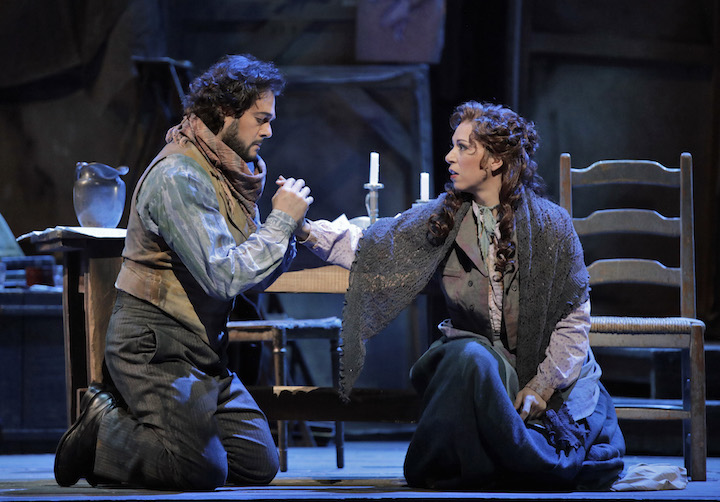
The love and youth of La Bohème
I was surprised to see children in the audience of Saturday’s performance of La Bohème at San Francisco Opera’s War Memorial Opera House. But not so surprised on second thought. It was the first opera I saw many years ago as a young teenager, and I was immediately and completely smitten.
With its accessibility, lush music and compact theatrical story, La Bohème offers a lot to any first-time viewer of opera. And for young children, there is the second act with its hordes of child singers cavorting around the stage and pestering the toyseller, amidst an enviable and identifiable mix of colorful and thrilling carnival events.
And even more there are the glimpses into adult love with its forbidden mysteries and unfathomable enticements.
This is not to say that La Bohéme is a children’s opera. It’s not. But it is an opera about youth. The antics of the four bohemian lads sharing a garret in Paris, or Musetta’s defiant and seductive waltz in the Café Momus, belong to a juncture in life that is both childlike and childish. A world of striving to grasp one’s identity and exult in the possibilities of life and love.
No wonder its unflagging popularity. It’s a world we all recognize, that holds within it our deepest longings and fears.
The production that is currently showing is a revival of the 2014 SF Opera production, a joint effort by San Francisco, Houston Grand Opera and Canada Opera Company, which debuted at Houston in 2012.
Arturo Chacón-Cruz and Erika Grimaldi sing the parts of the hapless lovers, Rodolfo and Mimì. They have both appeared on the SF Opera stage before: Chacón-Cruz as the Duke of Mantua, he of the fickle and exploitative nature, in the 2012 production of Rigoletto, and Grimaldi as Michaëla, she of the faithful and enduring nature, in the 2016 production of Carmen. There is a tentative, almost hesitant, quality to their first-act meeting that develops in the course of the scene into a passionate, more vibrantly sung, declaration of love. Chacón-Cruz’s tenor soared into lyrical moments. And Grimaldi’s interesting soprano is sweet and solid in the upper register while bordering on the earthiness of a mezzo in the lower notes. The pair made a thoughtfully adoring couple.
In contrast, Ellie Dehn’s Musetta and Audun Iversen’s Marcello made for the more raucous and volatile lovers. Clearly, Dehn loved singing her second-act waltz, voluptuously in both body and voice, her hot pink dress clinging to her ample curves. And Iversen was the disgruntled but ardent victim of her machinations, his big warm baritone reflecting his substantial presence as lover and friend.
Adler Fellow bass-baritone Brad Walker sang Schaunard, and bass Scott Conner sang Colline, the latter singing the touching fourth-act ode to his overcoat with polish and restrained tenderness.
Bass Dale Travis, a veteran of 13 seasons of San Francisco Opera, sang the dual role of the landlord Benoit and Musetta’s sugar daddy, Alcindoro.
The San Francisco Opera Orchestra played with its usual excellence under the baton of guest conductor Carlo Montanaro. The 20 children singing in the cast are members of the San Francisco Girls and Boys Choruses.
La Bohème is seldom reconfigured out of its milieu – 19th-century Paris – and the production team followed this tradition. The excellent sets by David Farley were composed of panels that snugly fit together and broke apart to turn into different scenes. The painterly quality of the panels gave definition to the lives of the young bohemians as artists. I was especially taken by the panel in Rodolfo’s garret that showed the landscape of Paris through an open attic window. The directing by John Caird was thorough and detailed, allowing the singers to stretch their dramatic abilities, and ending with a tableau of the six singers in various stages of unhappiness over the death of their beautiful but delicate friend, Mimì.
– Jaime Robles
San Francisco Opera’s La Bohème continues through July 2. For information and tickets, visit sfopera.com.
Photo: Arturo Chacón-Cruz and Erika Grimaldi sing Rodolfo and Mimì. Photo by Cory Weaver.
